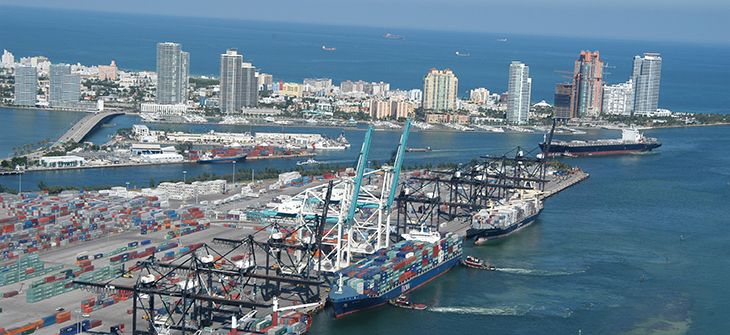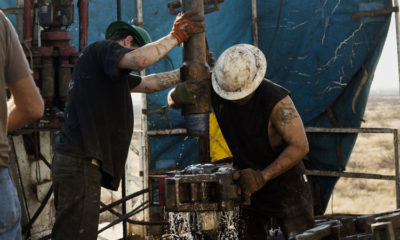Markets
How High Oil Production Cost Impacts Producers, Firms
Published
7 years agoon

- How High Oil Production Cost Impacts Producers, Firms
The dynamics of the global oil and gas industry are changing. Oil-producing countries and oil companies are seeking production cost-reduction by all means possible. This became necessary for companies to remain afloat and make profit while producer-countries make huge earnings from their hydrocarbon resources.
The drive for lower production cost is further heightened by the belief that the era of oil price at $100 per barrel is gone. Therefore, to remain competitive, the cost per barrel of crude has to be cheap or attract the required investment in the case of an oil-producing country.
However, Nigeria is still ranked among countries with one of the highest cost per barrel production. Available data on 13 oil producing nations, including United Kingdom (UK), Brazil, Nigeria, Venezuela, Canada, United States (US) shale, Norway, US non-shale, Indonesia, Russai, Iraq, Iran and Saudi Arabia, showed that in 2016, Nigeria was among the first on the list of countries with the highest production cost per barrel. She came after UK with $44.33 per barrel (bbl), Brazil -$34.99/bbl and Nigeria, $28.99/bbl. The last three countries on the list, Iraq, Iran and Saudi Arabia had the lowest production cost per barrel of $10.57, $9.08 and $8.98 respectively.
From the data, Gulf countries have the cheapest barrel of oil and are among the countries with highest output. For instance, Saudi Arabia’s daily oil production is about 12.3 million barrels; Iraq–4.8 million barrels daily and Iran, 3.8 million barrels daily, while Russia has about 11.4 million barrels production daily. This development has put countries with high production cost at very difficult situation, especially Nigeria that does not only depend on oil proceeds for the sustenance of her economy, but on imported refined petroleum products to power her commercial and industrial activities.
Challenging situation
Since the swing in oil price from end of 2014, the Federal Government has been emphasising the need for oil firms to consistently strive to drastically bring down their cost of production per barrel. The emphasis and anticipated action have become inevitable. Revenue due to the government from oil exports had significantly dropped due to low oil prices in the international market.
Besides, the volume of oil in the market is more than demand, leading to significant number of unsold cargoes of different oil grades in the market. Oil traders’ reports often show different grades of Nigerian oil begging for buyers, a situation that signals an urgent need to think outside the box on how to steer away from undue dependence on oil revenues to drive the economy.
The Minister of State for Petroleum Resources, Dr. Emmanuel Ibe Kachikwu, aptly put the disadvantaged state in which Nigeria is in the league of oil producing countries when he spoke at the inaugural Nigeria International Petroleum Summit (NIPS) in Abuja. He said considering that Nigeria’s over 50 years in oil business, it should be a model to other emerging oil producing countries in Africa.
However, Africa’s biggest oil producer still battles with a couple of challenges, which has kept its oil production cost far higher than most of its contemporaries. He said: “We are the largest oil producing country in Africa and perhaps, the largest gas producing country in Africa and have been into oil and gas business for nearly 50 years. We have had our ups and downs and need to set good examples for other African countries looking up to us for leadership in this sector.
“There are snapshots of what we need to achieve as an oil producing country to make our oil production efficient and profitableas well as be outstanding as we ought to be. The reality is that today if you cannot produce cheap cost oil, diversify the processing of your oil, look frankly into internalising and externalising the investments to your people and your foreign investors in the sector, capture the requisite technology skills that will help you operate efficiently, you are lost before you start.”
The Minister noted that in another 15 years, export of crude oil will be a shameful habit for any country that is doing it. “If you look at the movement in the Gulf and United States that have exited, quite frankly, the high production cost of oil, the drive to cut your production cost becomes more glaring. Everybody is coming at it in a different angle, shale in the US and diversification in the Gulf,” he added.
The clean energy focus, according to him, is beginning to make almost irrelevant the vast crude oil reserves that Nigeria has in the ground unless she can turn them into things that are clean.
“So, the challenge for oil companies operating in the country and Nigerians, who are in this sector, has changed. Historically, our business was to find the oil, sell it to earn foreign exchange, but it has got to be better than that now. Oil has got to provide work for our people, the resource to power this country, provide the operational environment that is transparent enough for others to take Nigeria serious.
“Oil has got to provide the technical and human skills set that are essential for us to export people out into other African countries and become major investors in other African countries, something the banking sector has tried to do over the last six to seven years,” Kachikwu noted.
Degeconek Oil and Gas Limited Managing Director/Chief Executive Officer and the immediate past president of the Nigerian Association of Petroleum Explorationists (NAPE), Mr. Abiodun Adesanya, however, disagreed that Nigeria has one of the world’s highest production cost per barrel of oil. He said owing to the country’s matured basin, it should have one of the cheapest barrel production costs in the world.
According to him, corruption and security issues, militancy in the Niger Delta region, among others, largely contributed to inflation of cost of oil production in Nigeria, but in the real sense of it, cost of producing a barrel is cheap in the country. He said: “1 wouldn’t agree that Nigeria’s cost per barrel production is among the highest in the world. A couple of factors outside oil substantially contribute to this. To be honest with you, I will say that cost per barrel is a function of cost of services. It is a function of wastages in the system (corruption, among others). But there is the actual cost per barrel. We don’t have any business in having a high cost per barrel given the matured and long history of exploration and production that we have had in Nigeria.
“If we move to new areas and try to develop them that will be understandable, but, there is a lot of amortised infrastructure that have been built a long time ago and they have paid for themselves already and are just being utilised. But if you are going to a new area, for example, Aje field production, they need a lot of new infrastructure such as floating production, storage and offloading vessel (FPSO), among others. So, we have gone past that point. Our cost per barrel has no business being high.”
Adesanya said because Nigeria had been in recession and the industry had been challenged by oil price, service cost has also come down. He said there were elements that had nothing to do with oil and gas on the technical side that were also exacerbating the cost per barrel. These include the non-technical cost, cost of joint taskforce (JTF), navy patrol vessel, cost of providing security and community issues.
‘’There is also the cost of repairing in a cyclical way the damaged infrastructure because all those costs are eventually shared and passed on to the cost per barrel. So, there is a technical cost that we know – cost of drilling, logging a well and seismics. There is cost of naval patrol vessel, gun-boat rental, repairing Trans Forcados multiple times, which can easily be avoided. By the time you add these on to the technical cost, you have this bogus cost per barrel. So, if we can try and address those issues and bring them down, I think we will be alright,” Adesanya reasoned.
Is the CEO and Founder of Investors King Limited. He is a seasoned foreign exchange research analyst and a published author on Yahoo Finance, Business Insider, Nasdaq, Entrepreneur.com, Investorplace, and other prominent platforms. With over two decades of experience in global financial markets, Olukoya is well-recognized in the industry.

You may like
-
70 Million Poorest of The Poor Nigerians To Get N75,000 From FG
-
Nigeria Surpasses OPEC Quota with 1.51 Million bpd, Targets 2.06 Million in 2025
-
Global Investors Commit $7.6 Billion to Nigeria’s Development at AIF 2024
-
Nigeria-China Trade Strengthened as Grimaldi Introduces Direct Shipping Line
-
Nigeria’s GDP Records 3.46% Growth in Q3 Spurred by Non-Oil Sector
-
President Tinubu Presents N47.9trn 2025 Budget As Debt Servicing, Security, Infrastructure Take Lion Shares













